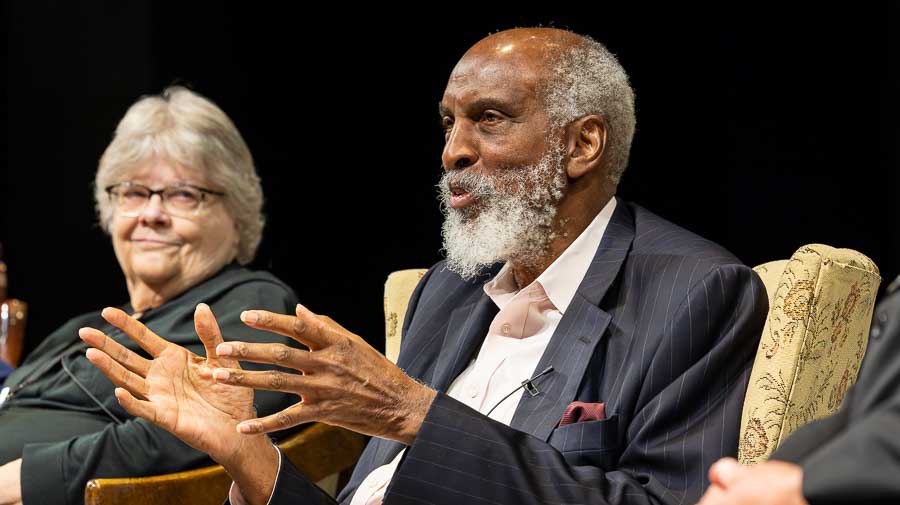Ashland doesn’t have childcare for all the families seeking seats, and that affects parents’ ability to work, but the city’s taking steps to help
By Paula Hyatt, John M. Love and Lisa Verner
Many of us have played musical chairs. The music stops and you race for a seat. In Oregon, access to early learning and childcare slots functions like a high stakes game of musical chairs.

Why? Oregon is a childcare desert. Meaning, for every three children needing early learning or childcare, there is only one slot available. According to the Southern Oregon Education Service District, only 40% of families seeking early learning and childcare in Ashland have access to slots. And of Ashland families who need financial assistance, only 17% have access to subsidies. Unfortunately, in Ashland, when the music stops, way too many of our families are left without a chair.
So why are early learning and childcare opportunities critical to thriving communities? And if my family does not have children aged 0-5, why should I care?
First, the presence of stable, accessible, and affordable care underpins strong local economies. Communities with access to affordable care have a more robust workforce from which to recruit. Portland State University conducted a study from December 2022 to January 2023 that found 40% of working families had a parent quit a job, turn down employment or substantively alter their employment status, because of childcare challenges. These challenges consist of limited program availability, high cost of care and program hours that do not match shift schedules. Locally, according to EQQUS Workforce Solutions, barriers for individuals seeking work in Ashland include:
- Childcare
- Housing
- Transportation
In conversations with EQQUS, month after month, EQQUS caseworkers report their clients are 100% employment ready but cannot take jobs offered because of a lack of childcare.
Conclusion 1: The strength of our workforce is directly connected to early learning and childcare availability.
Second, when our businesses have challenges in hiring and retaining employees and then they cannot hire, the local economy suffers. Many businesses report that employee turnover creates significant additional costs in the form of recruitment, training and degradation of institutional knowledge. This can sometimes dramatically affect continuity of operations.
Conclusion 2: Access to affordable early learning and childcare supports local businesses.
Third, when working families lack access to affordable care options, their ability to work and earn a living is gravely impacted. Loss of income due to lack of childcare affects a family’s ability to afford stable housing and meet their basic needs. It can even tip families into houselessness. For single parents in particular, patching together care that allows a parent to work, while looking for work that fits the schedule of available care, creates an untenable cycle, often then compromising an individual’s full earning potential.
Conclusion 3: Childcare and stable housing for families with young children are directly connected.
Finally, economic impacts also disproportionately affect women, historically marginalized populations, and low-income families. A U.S. Department of Labor-funded report by the Urban Institute said those engaging in unpaid childcare and forgoing employment opportunities (such as stay-at-home moms or dads) incur personal economic impacts that include:
- A 15% reduction in lifetime earnings.
- Reduced retirement income directly related to reduced lifetime earnings.
- Average lost wages totaling $237,000 over a lifetime.
Conclusion 4: Lack of childcare and early learning programs is an equity issue.
Communities that build reliable, accessible, and affordable early learning and childcare opportunities for working families simultaneously invest in their workforce, support local businesses, take proactive measures to prevent families from tipping into houselessness and facilitate the long-term financial wellbeing of citizens in the form of greater lifetime earnings potential and overall retirement savings.
Our communities thrive when our children are well cared for and their primary caregivers can pursue employment and education opportunities. However, the service delivery model for early learning and childcare is challenging. But by working together with our governmental partners, we are making strides at both the state and local levels.
At the state level:
- The recent short session included passage of $171,000 to help fund the significant demand for Employment Related Day Care benefits and help shorten the significant ERDC waitlist.
- In the summer 2023, the state Legislature appropriated $50 million for childcare infrastructure via grants and loans. Agencies may apply once the rule making process is completed.
- Finally, Oregon House Bill 4158 will add $5 million to the Childcare Infrastructure Fund with a focus on in-home and small-center providers. This bill establishes the Home and Small Center Child Care Fund and directs the Oregon Business Development Department to administer a grant program assisting childcare facilities that serve a maximum of 75 children for the purpose of establishing or expanding childcare infrastructure.
In Ashland:
- In the past year, local partners, including the Ashland Family YMCA and small in-home programs, have added over 40 slots to the city’s inventory of early learning and childcare opportunities.
- Your Ashland City Council created an ad hoc committee to study the local childcare landscape and recommend solutions that will provide working families with greater access to affordable early learning and childcare options.
- The City Council approved an Early Childhood Affordability pilot grant program with the goal of supporting community access to early learning. Two local providers received grant funds to offer subsidized childcare slots. Many families have benefited to date. One family responded that “This makes it more affordable to live in this town.”
By combining forces with state programs and local partners, the City of Ashland continues to seek early learning and childcare solutions that invest in our economy, our working families, and most important, our children. As this work continues, the ad hoc committee on Affordable Childcare and Early Learning will present a full update to the City Council at 6 p.m. May 7 at the Ashland Civic Center on East Main Street. Come and hear what the future holds!
Paula Hyatt is a member of the Ashland City Council. John M. Love and Lisa Verner are members of the ad hjoc committee on Affordable Childcare and Early Learning. Email Ashland City Councilor Paula Hyatt at [email protected]. Email letters to the editor and viewpoint submissions to [email protected].





















